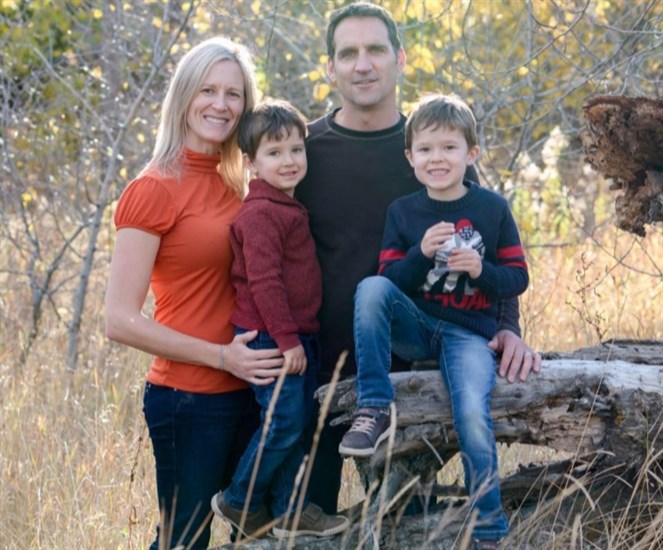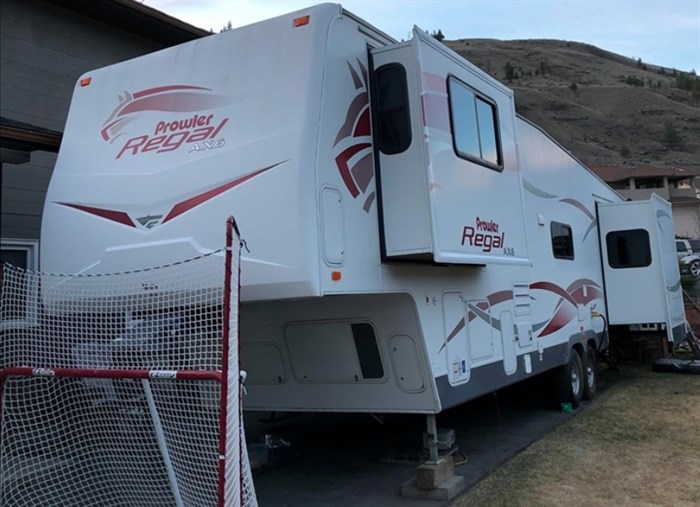
Tava Wales works as a nurse and will be spending her days living inside of an RV lent to her by a family friend.
Image Credit: FACEBOOK / Tava Wales
April 05, 2020 - 12:00 PM
Kari Starr said goodbye Wednesday to her seven-year-old daughter and explained she doesn’t know how long it will be until they can hug again.
She was preparing to go back to work after a short vacation when she had to make some tough decisions. Not about social distancing or getting groceries, but about protecting her daughter from the hazards of her work.
Starr is a nurse at Kelowna General Hospital and could catch COVID-19 at some point over the next few weeks and months — something that could put her daughter at risk because she has respiratory issues, including asthma.
“Going forward, I won’t see her until after COVID. It was a really hard decision because she's my everything… I told her it could be for a long time,” she said. “If I had to, I could drive by and wave to see her but that’s about it for now.”
For many nurses and health care workers, this could be one of the longest periods of time they’ve spent away from their kids.
Although Starr works in the psychiatric ward, she’s still at risk and her duties could change at any moment to put her in the middle of pandemic response. Her daughter is staying with her former partner for now.
“It’s going to increase, so we could change to a unit that provides care just for COVID, we just don’t know… it’s only getting worse. I will never take that chance for my daughter,” she says. "There’s no cost worth giving up for her. I'm not going to jeopardize any possibility of risk. We can FaceTime every day, and that's what it’s going to have to be for now.”
Nurses and health care workers like Starr have little guidance from Interior Health Authority about how to protect their families from exposure.
In an emailed statement from Susan Duncan, media relations for Interior Health Authority, hospital staff who provide direct care have been given guidance for safety precautions while they are at work. On the home front, staff are recommended to keep their work and home clothes separated, and are not required to self-isolate if they don’t have sick family members.
“Staff members are also advised to remove their clothes upon entry to their house for laundering and then to immediately shower. Hospital staff members make their own decisions about what other precautions they wish to take in their own homes,” Duncan said. “We understand that some health-care workers may choose different ways to minimize exposure of their family members.”
It's impossible to tell how many nurses in the Interior face this predicament, nor how to help them at this point.
Tava Wales is a nurse at Royal Inland Hospital and has also taken her isolation practices into her own hands, and trying to stay connected with her young children while staying a safe distance apart.
“I work in a hospital, and I do have a young family… it’s a little nervous walking into your house,” she said. “It’s a juggling act… It’s all just being very careful.”

This is the trailer where Tava Wales will spend the next few months until she feels it is safe to be with her children.
Image Credit: SUBMITTED / Tava Wales
She says distancing has been difficult to do and says it can be hard for children to understand. Earlier this week, she moved into a trailer to distance herself from her family, including two young children.
“I wanted somewhere where I could have the option of going and keeping my family safe,” Wales said. “Our house isn't really designed for this. We don't really have a space where I can be isolated, so my husband suggested we put the call out for an option to put an RV in the driveway.”
Wales and her husband made a call out for friends and even strangers looking to borrow an RV. They had an offer within a minute, and later that day her husband's friend came over to drop it off.
Before the RV was dropped off, Wales would spend five days a week tip-toeing around her home, cleaning everything and sleeping in the basement.
She said she knows of other hospital staff who are also planning to or are already living in isolated suites or RVs during the pandemic and says it is important to parents to keep a positive mindset for their kids.
“I don't want to scare my kids or make them feel like I don't want to see them, so it's really about… trying to normalize it as much as you can,” Wales said. “We try to make it fun. As soon as I come home we do an outing outside, we do dinner together outside, so it's just trying to normalize everything and kind of make them unaware of everything that’s going on.”
Christine Sorensen, president of the B.C. Nurses Union, says they have been calling upon the province to implement programs so nurses can have space, such as a hotel room, to self-isolate safely. For weeks, the union has received calls from nurses who are confused and worried about the lack of guidance from local health authorities and the province on how to keep their community and families safe.
“There aren't clear directions on what nurses should do when they leave their workplace. Across Canada there are discrepancies,” Sorenson said. “Nurses are very concerned. They’re very worried… they want to reduce any chance of community transmission, and they don’t want to take it home to their families.”
Sorensen said the nurses union is also pushing for changing and shower facilities at their workplace, and the option to receive clean scrubs upon starting their shift. Until those needs are met, she said nurses are often self-isolating from their families in uncomfortable situations.
“I’ve heard of many instances of nurses self-isolating, whether that’s in a room with a separate bathroom, whether they’ve sent their children and families to live with their parents or in-laws… some have even turned to set up spaces in their garage, which is a little bit cold,” Sorensen said. “Nurses are tired, they’re exhausted right now.”
She says the best way the community can help nurses and health care workers relieve stress is to offer to pick up groceries, drop off a meal, take their dogs for a walk or FaceTime with them and their children to keep the family entertained. She noted that nurses across the province are also very appreciative to hear the sounds of gratefulness that ring out when whole neighbourhoods clap, cheer and clang pots and pans.
To contact a reporter for this story, email Jenna Wheeler or call (250) 819-6089 or email the editor. You can also submit photos, videos or news tips to the newsroom and be entered to win a monthly prize draw.
We welcome your comments and opinions on our stories but play nice. We won't censor or delete comments unless they contain off-topic statements or links, unnecessary vulgarity, false facts, spam or obviously fake profiles. If you have any concerns about what you see in comments, email the editor in the link above.
News from © iNFOnews, 2020